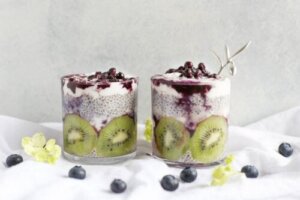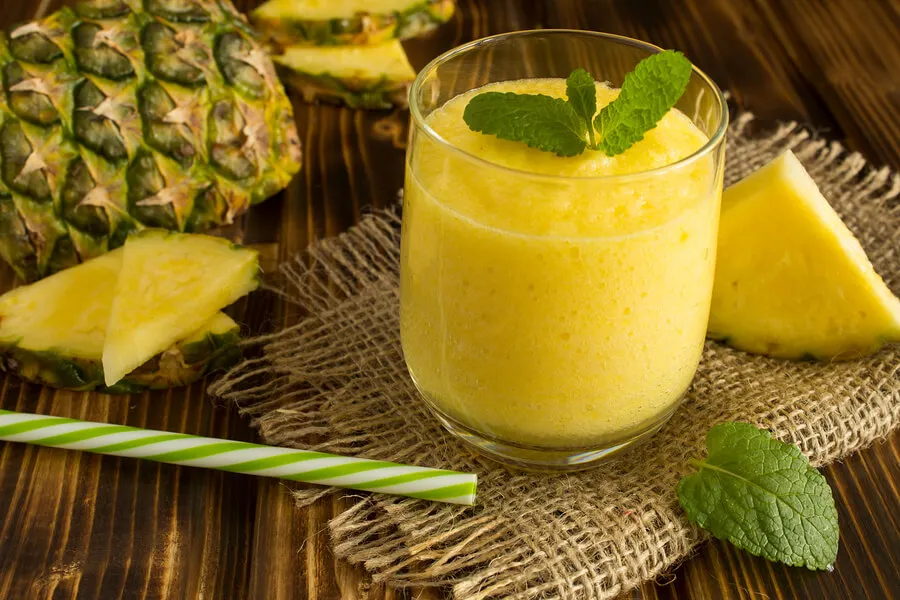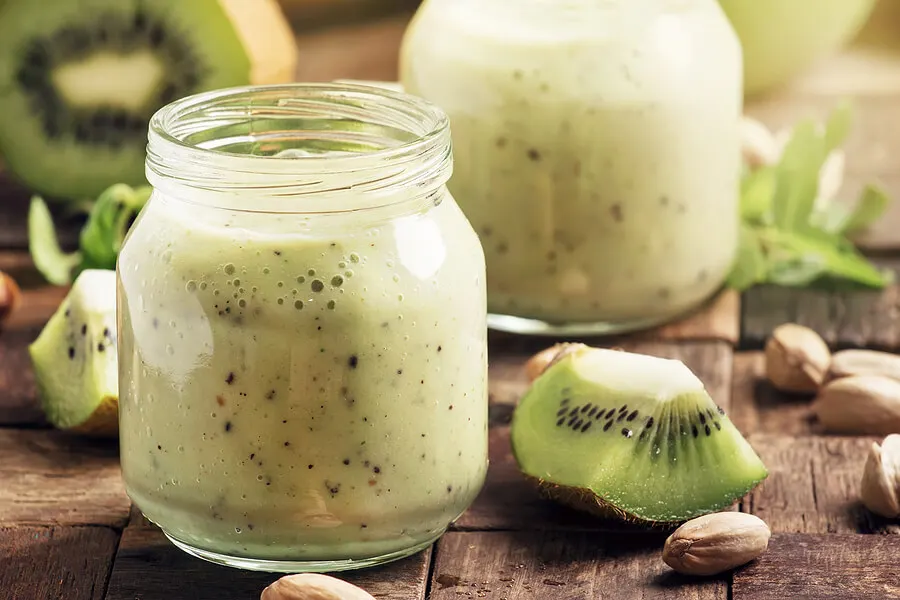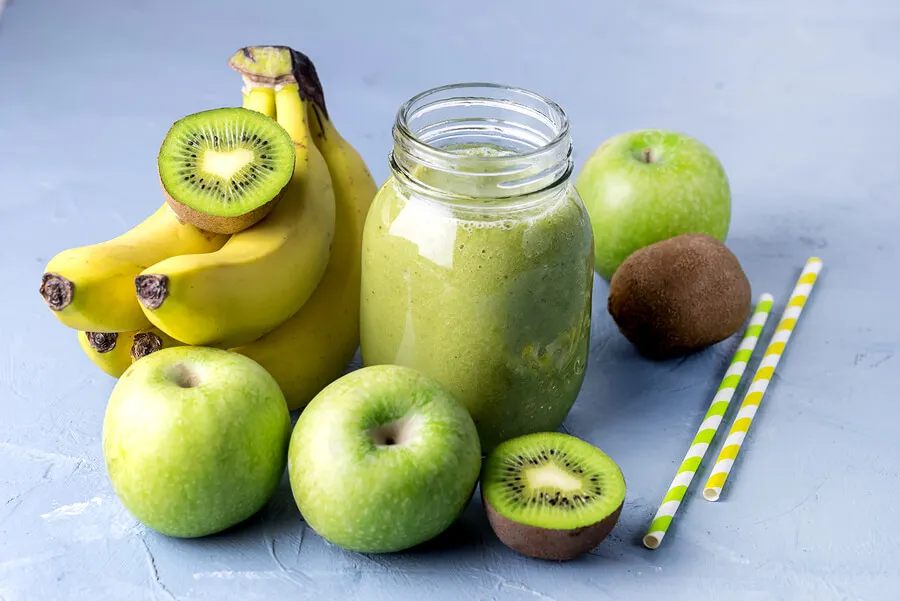5 Healthy Smoothies to Cleanse the Colon Naturally


Reviewed and approved by the doctor José Gerardo Rosciano Paganelli
The colon is the part of the digestive system in charge of eliminating waste from the body and extracting water and essential salts from it. When it’s unable to perform its functions properly, our health suffers. There are many things you can do about this, including trying healthy smoothies to cleanse your colon naturally.
However, although many people think they have a need to cleanse the colon, this is actually a misconception. When it’s healthy, the organ eliminates everything that the body does not need and fulfills the rest of its functions naturally by itself.
However, eating a diet rich in healthy foods, such as fruits, will support its proper functioning. There are also some drinks that can help you stay well hydrated throughout the day and complement your diet, but remember that you should always try to give priority to mineral water consumption.
5 smoothies to cleanse the colon naturally
The concept of “cleansing the colon” is surrounded by many misunderstandings. As we have already pointed out, the organ does not require external support or cleansing, since the body performs these functions naturally on its own.
As specialists point out, when we talk about “colon cleansing,” we’re actually referring metaphorically to a treatment that improves detoxification through the liver and the gastrointestinal tract. Also, it reduces inflammation or irritation of the mucous membranes of the gastrointestinal system.
Thus, when we talk about smoothies to cleanse the colon in a natural way, we’re referring to an action by these means. They are an alternative to store-bought preparations that ensure this type of cleansing, which often do not reflect what their exact compounds are on the label.
We think you may be interested in reading this, too: The Best Colorful Smoothies for Every Day of the Week
1. Pineapple, cucumber, and aloe vera

Pineapple is diuretic and contains important nutrients that can help us to take care not only of the body, but also of our health in general. In addition, it ‘s attributed to the anti-inflammatory properties of the colon.
Cucumber is also a diuretic and promotes digestion, besides containing significant amounts of water (it contains 95% per 100 grams).
Finally, aloe vera has properties that make it very beneficial for the gastrointestinal system, as shown by several studies, so it can be beneficial for the colon.
Ingredients
- 1 cucumber
- 2 oranges
- 1 apple
- 1 small pineapple
- Lemon juice
- 1 aloe vera stalk
Preparation
- Squeeze the juice of the oranges and the lemon. Set aside.
- Peel and slice the pineapple.
- Then, peel and slice the cucumber.
- Extract the gel from the aloe vera leaf.
- Finally, introduce all the ingredients in the blender. Add half a glass of water, as it makes blending easier.
- Blend everything for a few minutes, until you obtain a thick smoothie without lumps.
2. Flaxseed, lemon, and honey
Flaxseed is an ingredient increasingly used in cooking due to its multiple health benefits. It has been suggested that flaxseed supplementation improves overall bowel function. In addition, although more studies are needed, some research suggests that it may be useful in the prevention of colorectal cancer.
Lemon, in addition to having important antiseptic properties, is a powerful digestive agent. It’s attributed to the ability to improve the intestinal microbiome.
As for honey, apart from offering us numerous vitamins, it also has important antibacterial and antioxidant properties, which can help us fight against free radicals that affect the body.
Ingredients
- 2 lemons
- 1 glass of water (250 ml)
- 1 and a half teaspoons of honey (7.5 grams)
- 2 teaspoons of flaxseed (10 grams)
Preparation
- First, soak the tablespoon of flaxseed in a glass of water. Leave it overnight.
- The next day, strain the liquid and blend it in a blender with the juice of two lemons and honey.
Note: This smoothie can be varied by replacing the lemon with a large slice of papaya or pineapple.
3. Kiwi, pear, and flaxseed

The fruits used for the preparation of this smoothie make a significant contribution of soluble and insoluble fiber to improve digestion. When consumed as part of a balanced diet, they can contribute to the regulation of intestinal transit.
Kiwifruit has been used to improve discomfort in patients with irritable bowel syndrome with constipation. A single serving of fiber provides up to 6 grams; almost 1/4 of your body’s daily requirement.
Ingredients
- 1 kiwi
- 1 pear
- ½ glass of water (100 ml)
- 1 tablespoon of flaxseed (10 grams)
Preparation
- First of all, wash and peel the kiwi and the pear.
- Then, put them in the blender with half a glass of water to facilitate blending.
- Pour the juice into a glass. To finish, add a spoonful of ground flaxseed before drinking it.
4. Strawberry, parsley, and pineapple
This smoothie is rich in fiber and antioxidants, and since its ingredients have a high water content, it has a certain diuretic effect that helps to expel retained fluids and reduce swelling in the abdominal area.
On the other hand, the bromelain in pineapple may help to improve digestion to prevent constipation and gas. Bromelain is an enzyme that breaks down proteins as does pepsin, an enzyme that is part of gastric juice.
Ingredients
- 6 strawberries
- 1 slice of pineapple
- 1 tablespoon of fresh parsley (10 grams)
- ½ glass of water (125 ml)
Preparation
- Put all the ingredients in the blender. Add the water, as it makes blending easier.
- Blend everything until you obtain a liquid and smooth smoothie.
Like this article? You may also like to read: Say Goodbye to Constipation with These 8 Fruit Smoothies

5. Orange juice
It has been suggested that orange juice can be as effective as some osmotic laxative medications, such as polyethylene glycol. You can drink it on an empty stomach, preferably 100% concentrated and without adding any type of additive to sweeten it.
The consumption of these drinks should not replace your main meals or the treatment prescribed by your doctor. They should always be included as part of a balanced, varied, and sufficient diet.
If you want to lose weight or improve your health, always consult your doctor for advice on the best option for your case. If you resort to any measure without telling a professional, you may stop giving your body what it needs to function properly, something that can undoubtedly cause several problems.
There is no food, remedies, or shakes that can cleanse the colon in a natural way. Only good lifestyle habits and following your doctor’s instructions can provide results when it comes to taking care of your health.
On the other hand, remember that both a poor diet and a sedentary lifestyle are factors that influence the development of various diseases, so try to avoid them.
All cited sources were thoroughly reviewed by our team to ensure their quality, reliability, currency, and validity. The bibliography of this article was considered reliable and of academic or scientific accuracy.
- Aderinola, T., & Abaire, K. (2019). Quality Acceptability, Nutritional Composition and Antioxidant Properties of Carrot-Cucumber Juice. Beverages, 5(1), 15. https://www.mdpi.com/2306-5710/5/1/15
- DeLuca, J., Garcia-Villatoro, E., & Allred, C. (2018). Flaxseed Bioactive Compounds and Colorectal Cancer Prevention. Current Oncology Reports, 20(8), 59. https://link.springer.com/article/10.1007/s11912-018-0704-z
- de Oliveira, S., do Nascimento, H., Sampaio, K., & de Souza, E. (2021). A review on bioactive compounds of beet (Beta vulgaris L. subsp. vulgaris) with special emphasis on their beneficial effects on gut microbiota and gastrointestinal health. Critical Reviews in Food Science and Nutrition, 61(12), 2022-2033. https://www.tandfonline.com/doi/abs/10.1080/10408398.2020.1768510
- Elicia, V., Tjipto, B., & Novita, B. (2021). The effect of the cucumber consumption to the level of sodium potassium in mus muscullus’s urine production. The effect of the cucumber consumption to the level of sodium potassium in mus muscullus’s urine production. Folia Medica Indonesiana, 57(3), 210-213. https://e-journal.unair.ac.id/FMI/article/view/17697
- Ezzat-Zadeh, Z., Henning, S., Yang, J., Woo, S., Lee, R., Huang, J., Thames, G., Gilbuena, I., Tseng, C., Heber, D., & Li, Z. (2021). California strawberry consumption increased the abundance of gut microorganisms related to lean body weight, health and longevity in healthy subjects. Nutrition Research, 85, 60-70. https://www.sciencedirect.com/science/article/abs/pii/S0271531720305881
- Gearry, R., Fukudo, S., Barbara, G., Kuhn-Sherlock, B., Ansell, J., Blatchford, P., Eady, S., Wallace, A., Butts, C., Cremon, C., Barbaro, M. R., Pagano, I., Okawa, Y., Muratubaki, T., Okamoto, T., Fuda, M., Endo, Y., Kano, M., Kanazawa, M., Nakaya, N., Nakaya, K., & Drummond, L. (2023). Consumption of 2 Green Kiwifruits Daily Improves Constipation and Abdominal Comfort-Results of an International Multicenter Randomized Controlled Trial. American Journal of Gastroenterology, 118(6), 1058-1068. https://www.ncbi.nlm.nih.gov/pmc/articles/PMC10226473/
- Henning, S., Yang, J., Shao, P., Lee, R., Huang, J., Ly, A., Hsu, M., Lu, Q., Thames, G., Heber, D., & Li, Z. (2017). Health benefit of vegetable/fruit juice-based diet: Role of microbiome. Scientific Reports, 7(1), 2167. https://www.nature.com/articles/s41598-017-02200-6
- Hong, S., Chun, J., Park, S., Lee, H. J., Im, J., & Kim, J. (2018). Aloe vera Is Effective and Safe in Short-term Treatment of Irritable Bowel Syndrome: A Systematic Review and Meta-analysis. Journal of Neurogastroenterology and Motility, 24(4), 528-535. https://www.ncbi.nlm.nih.gov/pmc/articles/PMC6175553/
- Hossain, F., Akhtar, S., & Anwar, M. (2015). Nutritional Value and Medicinal Benefits of Pineapple. International Journal of Nutrition and Food Sciences, 4(1), 84-88. https://www.sciencepublishinggroup.com/article/10.11648/j.ijnfs.20150401.22
- Jana, P., & Pradhan, A. (2024). Medicinal and Health Benefits of Lemon. Journal of Science & Technology (JST), 6(1), 16-20. https://jst.org.in/index.php/pub/article/view/249
- Lasya, C. (2022). Spinach and its health benefits: A review. The Pharma Innovation Journal, 11(8), 1232-1239. https://www.thepharmajournal.com/special-issue?year=2022&vol=11&issue=8S&ArticleId=14953
- National Center for Complementary and Integrative Health. (2019). “Detoxes” and “Cleanses”: What You Need To Know. National Center for Complementary and Integrative Health. Consultado el 13 de junio de 2024. https://www.nccih.nih.gov/health/detoxes-and-cleanses-what-you-need-to-know
- Parikh, M., Maddaford, T., Austria, J., Aliani, M., Netticadan, T., & Pierce, G. N. (2019). Dietary Flaxseed as a Strategy for Improving Human Health. Nutrients, 11(5), 1171. https://www.mdpi.com/2072-6643/11/5/1171
- Reiland, H., & Slavin, J. (2015). Systematic Review of Pears and Health. Nutrition Today, 50(6), 301-305. https://www.ncbi.nlm.nih.gov/pmc/articles/PMC4657810/
- Schell, K., Fernandes, K., Shanahan, E., Wilson, I., Blair, S., Carter, D., & Cokcetin, N. (2022). The Potential of Honey as a Prebiotic Food to Re-engineer the Gut Microbiome Toward a Healthy State. Frontiers in Nutrition, 9. https://www.ncbi.nlm.nih.gov/pmc/articles/PMC9367972/
- U. S. Department of Agriculture. (1 de abril de 2019). Pears, raw. USDA. Consultado el 30 de julio del 2024 https://fdc.nal.usda.gov/fdc-app.html#/food-details/169118/nutrients
- U. S. Department of Agriculture. (28 de octubre de 2022). Cucumber, with peel, raw. Consultado el 30 de julio del 2024 https://fdc.nal.usda.gov/fdc-app.html#/food-details/2346406/nutrients
- Venancio, V., Kim, H., Sirven, M., Tekwe, C., Honvoh, G., Talcott, S., & Mertens-Talcott, S. (2018). Polyphenol-rich Mango (Mangifera indica L.) Ameliorate Functional Constipation Symptoms in Humans beyond Equivalent Amount of Fiber. Molecular Nutrition & Food Research, 62(12). https://onlinelibrary.wiley.com/doi/abs/10.1002/mnfr.201701034
- Wei, G., Ye, Y., Yan, X., Chao, X., Yang, F., Wang, M., Zhang, W., Yuan, C., & Zeng, Q. (2020). Effect of banana pulp dietary fibers on metabolic syndrome and gut microbiota diversity in high-fat diet mice. Journal of Food Biochemistry, 44(9). https://onlinelibrary.wiley.com/doi/abs/10.1111/jfbc.13362
- Yu, M., Kong, X., Chen, T., & Zou, Z. (2024). In vivo metabolism combined network pharmacology to identify anti-constipation constituents in Aloe barbadensis Mill. Journal of Ethnopharmacology, 319(Parte 1). https://www.sciencedirect.com/science/article/abs/pii/S037887412301070X
- Zhang, Y., Zeng, M., Zhang, X., Yu, Q., Zeng, W., Yu, B., Gan, J., Zhang, S., & Jiang, X. (2023). Does an apple a day keep away diseases? Evidence and mechanism of action. Food Science & Nutrition, 11(9), 4926-4947. https://www.ncbi.nlm.nih.gov/pmc/articles/PMC10494637/
This text is provided for informational purposes only and does not replace consultation with a professional. If in doubt, consult your specialist.








